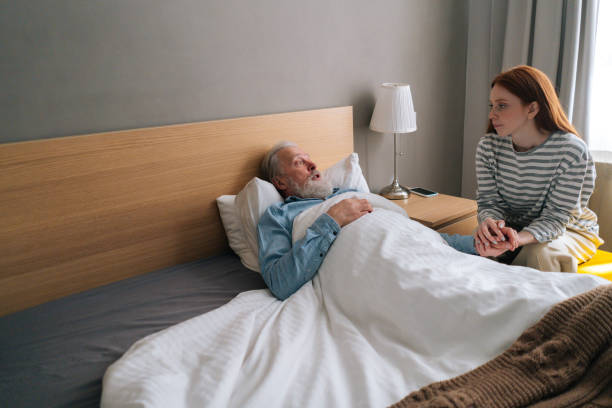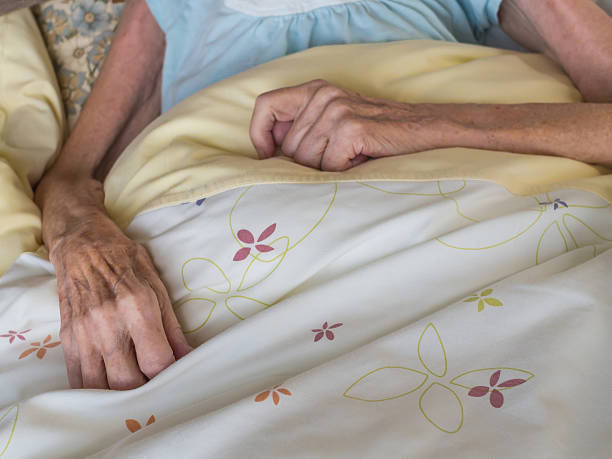Introduction

Sleep disorders are a common and distressing symptom experienced by individuals living with Parkinson's disease. The restless nights, frequent awakenings, and difficulty falling asleep impact the quality of their rest and contribute to the overall decline in their well-being. However, there is hope on the horizon, as research suggests that the right bedding can play a pivotal role in alleviating the sleep disorders associated with Parkinson's.
By understanding the unique needs of individuals with this neurological condition and selecting bedding that offers optimal mobility and comfort, support, and temperature regulation, we can unlock the potential for a restful night's sleep, improving physical and mental health. In this blog post, we delve into the fascinating connection between bedding and Parkinson's sleep disorders, exploring how the right bedding choices can make a world of difference in the lives of those affected.
What is Parkinson's disease?

Parkinson's disease (PD) is a progressive nervous system disorder that affects movement. It is caused by the brain's loss of dopamine-producing nerve cells, which results in tremors, stiffness, and slowness of movement. The symptoms of Parkinson's can vary from person to person but usually include trembling hands, a shuffling gait, a stooped posture, decreased facial expression, and difficulty speaking.
How the Right Bedding Can Alleviate Parkinson's Sleep Disorders
Sleep issues are a common symptom of Parkinson's disease. People with PD often experience insomnia, restless legs syndrome (RLS), excessive daytime sleepiness (EDS), and REM sleep behavior disorder (RBD). People with PD need to invest in the right bedding to get a good night's rest.
The most important bedding for people with Parkinson's is a mattress that will provide comfort and support. A firm yet supportive mattress can help ease body aches and pains and alleviate symptoms of RLS. In addition, it is a good idea to look for mattresses with cooling properties, as overheating can be an issue for some people with PD.
In addition to a supportive mattress, having the right bedsheets and sleepwear is also important for people with Parkinson's. Look for breathable, lightweight fabrics. Some have moisture-wicking properties which help keep a person dry and comfortable from night sweats. For restlessness or tossing and turning use friction-reducing sheets and sleepwear. These enable easier moving taking away much of the struggle many people with Parkinson’s experience and dread.
Finally, it is important to have a good lighting setup so that people with PD can sleep in darkness. Excess light can interrupt the body's natural circadian rhythms, leading to insomnia and other sleep issues. Consider investing in blackout curtains or a dimmable lamp that can be used for bedtime reading.
Investing in the right bedding and sleepwear is essential for people with Parkinson's who want a good night's rest. Quality bedding can help alleviate insomnia symptoms, RLS, EDS, and RBD, allowing people with PD to sleep better and maintain their quality of life. Sheets and sleepwear designed to take the struggle out of nighttime moving can improve sleep and quality of life.
What specific features should I look for in bedding to improve sleep for someone with Parkinson's?

When it comes to choosing bedding that will help improve sleep for someone living with Parkinson's Disease, certain features may be particularly beneficial.
Supportive mattresses and bedding:
Mattresses that offer a higher level of support are recommended for people with Parkinson's Disease, as they help keep the body in proper alignment while sleeping. It is also important to ensure that bedding provides adequate cushioning and padding to reduce pressure points on joints and muscles. It is best to take advantage of trial periods to find what works best for you.
Temperature-regulating bedding:
People living with Parkinson's Disease often experience fluctuations in body temperature, so it is important to choose bedding that can help to regulate temperature. Look for breathable materials with moisture wicking properties, which can help keep the sleeper more comfortable throughout the night.
Anti-allergen bedding:
For individuals with allergies or sensitivities, selecting bedding made from hypoallergenic materials such as microfiber is important. These materials help reduce the risk of allergic reactions while sleeping, providing a more comfortable sleep environment.
Easy-care bedding:
It can be difficult for someone with Parkinson's disease to change sheets frequently, so look for bedding that is easy to care for and maintain, such as wrinkle-resistant fabrics or those with quick-drying properties.
Ultimately, choosing bedding that is comfortable and supportive and meets the individual's specific needs is important. With the right bedding, individuals living with Parkinson's Disease can enjoy a more restful night of sleep.
How can adjustable beds benefit Parkinson's patients with sleep disorders?
Here are some benefits of adjustable beds for Parkinson's patients with sleep disorders:
- Comfort: Adjustable beds provide comfort to those who suffer from sleep-related issues associated with Parkinson's disease by providing an adjustable head and foot angle, allowing the patient to control their sleeping position. This enables them to find a comfortable position that helps keep them asleep throughout the night.
- Improved circulation: Adjustable beds can also help improve circulation for those with Parkinson's disease by providing an adjustable head and foot angle, which helps reduce the pressure on their legs and feet, increasing blood flow to muscles throughout the body.
- Reduced risk of bed sores: The adjustable angles provided by an adjustable bed also help reduce the risk of bed sores, a common occurrence among those with Parkinson's disease.
- Reduced snoring: Adjustable beds can also help reduce the frequency and intensity of snoring, making it easier for those with sleep-related issues to get restful sleep.
- Reduced stress: Adjustable beds can also help reduce stress levels by providing an adjustable head and foot angle, allowing the patient to find a comfortable position that helps them feel more relaxed and have a better night's sleep.
Adjustable beds are just one example of how the right sleep supports can help alleviate sleeping issues for those with Parkinson's disease. Other bedding features include mobility-enhancing sheets and sleepwear that minimize friction, mattress toppers, memory foam mattresses, and adjustable pillows. These elements can all work in tandem to provide the support and comfort needed for a restful night's sleep.
How can the right bedding help reduce the impact of restless leg syndrome, a common sleep disorder among Parkinson's patients?
Restless leg syndrome, or RLS, is a neurological disorder that causes an uncontrollable urge to move the limbs while at rest. It's a sleep disorder that can cause difficulty falling and staying asleep for those affected. It's also common among people with Parkinson's disease and may affect up to 50% of those with it.
Having the right bedding can help reduce the effects of RLS and promote better sleep. A mattress that is too firm or soft, as well as a pillow that is too high or too low, may exacerbate symptoms by causing further discomfort. It's important to find a mattress and pillow combination that provides adequate support without putting pressure on certain areas of the body. It may help to change positions throughout the night while sleeping as well. This can be achieved by using friction-reducing sheets and sleepwear that make moving easier. Then, changing position with ease and more spontaneity can help alleviate the discomfort of RLS thereby promoting better sleep.
Finding the right mattress and pillow combination can help reduce pain and discomfort caused by RLS, allowing for better sleep and a more restful night. Additionally, keeping your bedroom dark, quiet, and cool helps create a better environment for sleeping. It is also important to practice good sleep hygiene, such as avoiding caffeine and alcohol before bedtime and getting regular exercise during the day. Those with RLS can find relief and improved rest with proper bedding and sleep habits.
FAQ's
What is the best bedding for Parkinson's patients?
The best bedding for Parkinson's patients offers support, ease of mobility, cushioning, temperature control, and hypoallergenic materials. It should also be easy to care for and maintain. Additionally, adjustable beds can benefit those with Parkinson's Disease.
How can I help my Parkinson's patient sleep at night?
Helping your Parkinson's patient sleep better at night starts with finding the right bed environment. Look for bedding that offers ease of mobility, temperature control, and hypoallergenic materials. Additionally, adjustable beds can help provide comfort and relief from pain and discomfort. Other tips to help a Parkinson's patient sleep better include creating a dark, quiet, and cool sleeping environment, avoiding caffeine and alcohol before bedtime, and getting regular exercise during the day.
How do you get in and out of bed with Parkinson's disease?
Getting in and out of bed with Parkinson's can be difficult, but there are steps you can take to make it easier. Friction-reducing sheets with built-in “brake safety borders” along the sides and corresponding sleepwear form a system to make moving in and out of bed and turning easier. To reduce the risk of falling from bed if sitting balance is impaired, use a sturdy bed rail to improve stability and safety. Ensure bed height is optimal for ease of standing up and sitting down at the bedside. Bed risers are available to attain the best height.
Why can't people with Parkinson's sleep at night?
People with Parkinson's may have trouble sleeping due to various sleep disorders associated with the condition, such as restless leg syndrome or excessive daytime sleepiness. Other contributing factors to poor sleep include immobility, pain from muscle stiffness and joint swelling, stress, anxiety, and depression.
How important is sleep for Parkinson's disease?
Sleep is essential for everyone but especially important for those with Parkinson's disease. Getting enough sleep helps the body recover, regenerate, and repair itself at night. Poor sleep can also contribute to further fatigue, mood swings, cognitive impairment, and a weakened immune system. Therefore, it is recommended that people with Parkinson's prioritize getting adequate restful sleep each night.
Conclusion
I hope this article has helped you understand how the right bedding can help those with Parkinson's disease alleviate sleeping issues. Whether it's an adjustable bed, mattress topper, friction-reducing sheets and sleepwear sets, or all three combined, having the right bedding can make a big difference in your sleep quality. Additionally, creating a dark, quiet environment and focusing on good sleep hygiene is key to helping those with Parkinson's get adequate rest. With the right combination of bedding and sleep habits, you can help reduce the impact of sleeping disorders and improve your overall quality of life.

